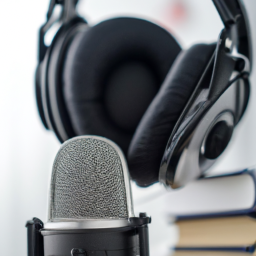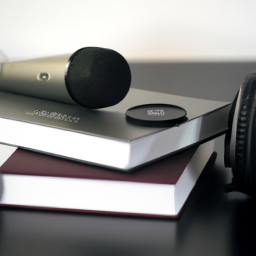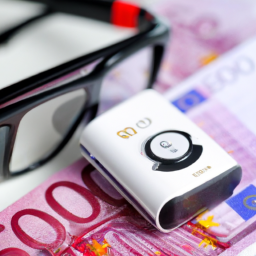
Are you passionate about reading and have a great voice? If so, you might be interested in learning how to record audiobooks for money. In today's digital age, audiobooks have become increasingly popular, providing a convenient way for people to enjoy their favorite stories while on the go. And with the growing demand for audiobooks, there are plenty of opportunities for talented individuals like yourself to turn your love for reading into a lucrative side hustle or even a full-time career. In this blog post, we will guide you through the process of recording audiobooks for money, from setting up a home studio to finding audiobook narration gigs. So, if you're ready to embark on a rewarding journey that combines your love for literature and the potential to earn an income, keep reading to discover how to get started in the world of audiobook narration.
Steps to Start Recording Audiobooks for Money
Introduction
Welcome to the world of audiobook narration, where your voice can bring stories to life and earn you some extra cash. If you have a passion for reading and a pleasant voice, this could be the perfect opportunity for you. In this guide, we will walk you through the step-by-step process of starting your journey as an audiobook narrator and making money along the way.
Step 1: Set Up Your Recording Space
Creating a suitable recording environment is crucial to ensure high-quality audio recordings. Find a quiet room in your house where you can minimize background noise. Consider using soundproofing materials or blankets to reduce echoes. Invest in a good quality microphone and headphones to capture your voice with clarity. Additionally, a pop filter can help eliminate unwanted plosive sounds.
Arrange your equipment in a comfortable and ergonomic setup. Make sure you have a reliable computer or laptop with audio editing software installed. This will come in handy during post-production.
Remember, a quiet and well-equipped recording space is the foundation of professional audiobook narration.
Step 2: Choose the Right Audiobook Genre
Before diving into recording, it's essential to identify the audiobook genres that align with your interests and strengths. Choose genres that you enjoy reading and have a good understanding of. This will make the recording process more enjoyable and help you engage with the material better.
Consider your target audience and market demand when selecting genres. Popular genres like mystery, romance, and self-help often have a larger listener base, increasing your chances of earning money.
Remember, selecting the right genre is crucial to attract listeners and maximize your earning potential.
Step 3: Find Audiobook Narration Opportunities
Now that you have your recording space set up and know which genres to focus on, it's time to find audiobook narration opportunities. There are several ways to do this:
1. Join Audiobook Narration Platforms: Websites like ACX, Voices.com, and Findaway Voices connect narrators with authors and publishers looking for voice talent. Create a compelling profile highlighting your skills and experience to attract potential clients.
2. Network with Authors and Publishers: Attend writing conferences, join online writing communities, and reach out to authors and publishers directly. Building relationships in the industry can lead to audiobook narration opportunities.
3. Freelancing Platforms: Platforms like Upwork and Fiverr often have audiobook narration gigs available. Create a captivating profile and showcase your previous work to stand out from the competition.
Step 4: Prepare for Recording
Once you secure an audiobook narration project, it's time to prepare for recording. Here's what you need to do:
1. Read and Understand the Material: Familiarize yourself with the book by reading it thoroughly. Take note of characters, their personalities, and any specific accents or dialects required. Understanding the material will help you deliver a more authentic and engaging performance.
2. Practice and Warm Up: Before hitting the record button, warm up your vocal cords. Perform breathing exercises, tongue twisters, and vocal exercises to ensure your voice is in optimal condition. Practice reading passages from the book to get comfortable with the text.
3. Create a Recording Schedule: Establish a consistent recording schedule to maintain productivity and meet deadlines. Dedicate specific time slots for recording, editing, and breaks. This will help you stay organized and focused throughout the process.
Step 5: Record and Edit Your Audiobook
Now comes the exciting part – recording your audiobook. Follow these steps for a smooth recording process:
1. Set Up Your Recording Software: Open your preferred recording software and ensure the microphone and headphones are properly connected. Adjust the input levels to avoid distortion or clipping.
2. Start Recording: Position yourself comfortably in front of the microphone and begin recording. Remember to maintain a consistent distance from the microphone and speak clearly. Take breaks when needed to rest your voice.
3. Edit and Enhance the Audio: Once you finish recording, it's time to edit and enhance the audio. Use audio editing software to remove any mistakes, background noise, or long pauses. Enhance the audio quality by adjusting the volume levels, equalizing the sound, and adding subtle effects if necessary.
4. Prooflisten and Review: Before finalizing your audiobook, prooflisten to the entire recording. Check for any errors, mispronunciations, or inconsistencies. Make necessary corrections and ensure the final product meets the highest quality standards.
Conclusion
Congratulations! You've now learned the essential steps to start recording audiobooks for money. Remember, building a successful career as an audiobook narrator takes time and dedication. Continuously improve your skills, explore new genres, and market yourself effectively to attract more clients. With persistence and a passion for storytelling, you can turn your love for reading into a rewarding source of income.

Essential Equipment and Software for Audiobook Recording
Introduction
Recording audiobooks for money can be a fulfilling and lucrative venture for those with a passion for storytelling and a good voice. To ensure professional-quality recordings, it's crucial to have the right equipment and software. In this guide, we will walk you through the essential tools needed to record audiobooks and provide you with insights on how to make the most out of your recording sessions.
Microphones
When it comes to recording audiobooks, the microphone you choose can make a significant difference in the sound quality. Here are a few options to consider:
1. Condenser Microphones: Condenser microphones are widely used in professional recording studios due to their sensitivity and ability to capture detailed sound. They are ideal for capturing the nuances of your voice, resulting in a rich and clear audio recording. Popular condenser microphones include the Audio-Technica AT2020 and the Rode NT1.
2. Dynamic Microphones: Dynamic microphones are more durable and versatile, making them suitable for various recording environments. They are less sensitive than condenser microphones and can handle high sound pressure levels without distortion. The Shure SM58 and the Electro-Voice RE20 are popular dynamic microphone choices for audiobook recording.
3. USB Microphones: USB microphones are a convenient option for beginners or those on a budget. They connect directly to your computer via USB and offer decent sound quality without the need for additional audio interfaces. The Blue Yeti and the Audio-Technica ATR2100x-USB are popular USB microphone choices.
Headphones
Investing in a good pair of headphones is crucial for monitoring your audio while recording. Here are some factors to consider when choosing headphones for audiobook recording:
1. Closed-Back Headphones: Closed-back headphones provide excellent noise isolation, preventing sound leakage into the microphone. This ensures a cleaner recording without unwanted background noise. The Audio-Technica ATH-M50x and the Beyerdynamic DT 770 Pro are popular closed-back headphone choices.
2. Comfort and Fit: Since you'll be wearing headphones for extended periods, it's essential to choose a pair that is comfortable and fits well. Look for adjustable headbands, cushioned ear cups, and lightweight designs to avoid discomfort during long recording sessions.
Audio Interfaces and Preamps
An audio interface is necessary to connect your microphone to your computer and convert the analog audio signal into a digital format. Additionally, a preamp can enhance the microphone's signal before it reaches the interface. Here's what you need to know:
1. Audio Interfaces: Focusrite Scarlett and PreSonus AudioBox are popular audio interfaces among audiobook narrators. Look for an interface with at least one XLR input for connecting your microphone and USB connectivity for seamless integration with your computer.
2. Preamps: While some audio interfaces have built-in preamps, dedicated preamps can provide better control over your microphone's gain and improve the overall sound quality. The Cloudlifter CL-1 and the Universal Audio Solo/610 are highly regarded preamp options.
Recording Software
Choosing the right recording software is essential for editing and producing high-quality audiobooks. Here are a few popular options:
1. Audacity: Audacity is a free, open-source software that offers basic recording and editing capabilities. It's user-friendly and suitable for beginners or those on a tight budget. While it may lack some advanced features, it's a reliable choice for simple audiobook recordings.
2. Adobe Audition: Adobe Audition is a professional-grade software widely used in the audio industry. It provides a comprehensive set of tools for recording, editing, and mixing audio. With its advanced features and intuitive interface, it's an excellent choice for audiobook production.
3. Reaper: Reaper is a versatile and affordable digital audio workstation (DAW) that offers a wide range of features for recording and editing audio. It's highly customizable and suitable for both beginners and experienced users.
Conclusion
Investing in the right equipment and software is crucial for recording audiobooks that meet professional standards. By choosing the right microphone, headphones, audio interface, preamp, and recording software, you can ensure high-quality audio recordings that captivate listeners. Remember to experiment, practice, and continuously improve your recording techniques to enhance your audiobook narration skills and increase your chances of success in the audiobook industry. Happy recording!

Tips and Strategies to Monetize Your Audiobook Recordings
Are you passionate about reading books and have a pleasant voice? If so, recording audiobooks can be a great way to turn your passion into a profitable venture. In this article, we will explore some tips and strategies to help you monetize your audiobook recordings.
1. Choose the Right Genre
The first step in monetizing your audiobook recordings is to choose the right genre. Research the current market trends and identify genres that are in high demand. Genres like self-help, romance, mystery, and fantasy are usually popular among audiobook listeners. By selecting a genre that has a large audience, you increase the chances of your audiobook being successful.
Additionally, consider your own interests and expertise. Recording an audiobook in a genre that you are passionate about will make the process more enjoyable and help you deliver a better performance. Remember, your enthusiasm for the content will shine through your narration and engage listeners.
Once you have chosen a genre, select a specific book that aligns with your interests and has the potential to attract a wide audience.
2. Set Up a Home Recording Studio
To produce high-quality audiobook recordings, it is essential to set up a home recording studio. While professional studios are available, they can be expensive to rent. Creating your own studio at home allows you to save costs and have more control over the recording process.
Start by selecting a quiet room in your house, preferably one with minimal background noise. Soundproof the room by adding acoustic panels or blankets to reduce echo and external sounds. Invest in a good quality microphone, headphones, and a pop filter to ensure clear and professional-sounding recordings.
Use audio recording software like Audacity or Adobe Audition to capture and edit your recordings. Experiment with different microphone positions and settings to find the best sound quality for your voice.
3. Perfect Your Narration Skills
Recording an audiobook requires more than just reading the text. To engage listeners and make your recordings stand out, you need to develop excellent narration skills.
Start by practicing reading aloud regularly. Pay attention to your tone, pacing, and pronunciation. Experiment with different voices and accents to bring the characters to life. Listen to professional audiobook narrators and analyze their techniques. Take note of their pacing, emphasis, and use of pauses.
Consider taking voice acting or public speaking classes to improve your vocal delivery. These classes can help you learn breathing techniques, vocal warm-ups, and other skills that will enhance your narration abilities.
Remember to maintain a conversational tone throughout the recording. Imagine you are speaking directly to the listener, creating a personal connection. This will make the audiobook more enjoyable and relatable.
4. Publish and Market Your Audiobook
Once you have recorded and edited your audiobook, it's time to publish and market it to start earning money. There are several platforms where you can self-publish your audiobook, such as Audible, ACX, and iTunes Audiobooks.
Before publishing, ensure your audiobook meets the platform's technical requirements and follows their guidelines. Create an eye-catching cover art that reflects the genre and content of your audiobook.
To market your audiobook effectively, consider the following strategies:
a. Build an Author Platform: Create a website or blog where you can showcase your audiobook and engage with potential listeners. Share behind-the-scenes stories, author interviews, and updates about your upcoming projects. Use social media platforms to connect with your audience and promote your work.
b. Leverage Reviews and Ratings: Encourage listeners to leave reviews and ratings for your audiobook. Positive reviews and high ratings can significantly boost your book's visibility and credibility.
c. Collaborate with Influencers: Partner with influencers or bloggers in your genre to promote your audiobook. Offer them free copies in exchange for honest reviews or features on their platforms.
d. Run Promotions and Discounts: Periodically offer discounts or promotions to attract new listeners. Consider running ads on relevant websites or social media platforms to reach a wider audience.
e. Engage with Your Audience: Respond to listener feedback and engage in conversations with your audience. Building a loyal fan base will not only increase sales but also generate positive word-of-mouth recommendations.
Remember, marketing is an ongoing process. Continuously explore new strategies and adapt your approach based on the feedback and preferences of your target audience.
By following these tips and strategies, you can successfully monetize your audiobook recordings. Remember to choose the right genre, set up a home recording studio, perfect your narration skills, and effectively publish and market your audiobook. With dedication and perseverance, you can turn your passion for reading into a profitable venture.
Here's what we learned
So you love reading books and have a great voice? Why not combine these two passions and make some money by recording audiobooks? With the rising popularity of audiobooks, there is a growing demand for talented narrators who can bring stories to life through their captivating voices. In this blog post, we will guide you through the process of recording audiobooks for money, helping you turn your hobby into a profitable venture.
Firstly, you need to set up a home recording studio. Find a quiet space in your house, preferably a room with minimal background noise. Invest in a good quality microphone, headphones, and audio editing software. Practice proper microphone technique to ensure clear and professional recordings. Once you have your studio ready, it's time to choose the right books to narrate. Look for public domain books or connect with authors and publishers who are willing to collaborate. Make sure to select genres you are comfortable with and showcase your unique voice. Finally, start marketing your services by creating a portfolio of your work and reaching out to audiobook producers and platforms. With dedication and perseverance, you can turn your passion for reading into a lucrative audiobook narration career.
Frequently Asked Questions (FAQ):
Q1: How can I make money by recording audiobooks?
A1: To make money by recording audiobooks, you can start by setting up a home recording studio or using professional recording facilities. Once you have the necessary equipment, you can either audition for audiobook narration gigs on platforms like ACX or find freelance opportunities on websites like Fiverr or Upwork. Additionally, you can self-publish your own audiobooks on platforms like Audible and earn royalties from sales.
Q2: What equipment do I need to record audiobooks?
A2: To record high-quality audiobooks, you'll need a few essential pieces of equipment. These typically include a good quality microphone, a pop filter to reduce plosive sounds, a microphone stand or boom arm, a shock mount to reduce vibrations, and a good pair of headphones for monitoring your recordings. Additionally, you may need a soundproofing setup or a quiet recording space to ensure clear and professional audio.
Q3: Do I need professional voice acting experience to record audiobooks?
A3: While professional voice acting experience can certainly be beneficial, it is not always a requirement to record audiobooks. Many successful audiobook narrators have found success without prior experience. However, having a good speaking voice, clear diction, and the ability to bring characters to life through your narration is essential. Practice and honing your skills through voice acting courses or workshops can greatly improve your chances of success.
Q4: How much can I earn by recording audiobooks?
A4: The earning potential for recording audiobooks can vary greatly depending on various factors such as the length of the book, the royalty rate offered, and the popularity of the book. As a beginner, you may earn around $100-$200 per finished hour of audiobook narration. However, experienced narrators who secure high-profile projects or have a large fan base can earn significantly more. It's important to note that building a successful audiobook narration career may take time and persistence.
Q5: Are there any resources or communities to help me get started with recording audiobooks?
A5: Absolutely! There are several resources and communities available to help you get started with recording audiobooks. Websites like ACX and Voices.com provide valuable information, audition opportunities, and resources for aspiring audiobook narrators. Joining online forums or social media groups dedicated to audiobook narration can also connect you with experienced narrators who can offer guidance and support. Additionally, consider exploring voice acting courses or workshops to improve your skills and network with industry professionals.
Adam has been actively involved in the make money online industry for the past decade. He has worked tirelessly to help individuals achieve financial freedom through various online ventures. His expertise in affiliate marketing, e-commerce, and digital product creation has been instrumental in helping many individuals make a living online. He is a sought-after speaker who has been invited to numerous conferences and events to share his insights on how to make money online. He has authored several books on the subject, including the two bestsellers.
Adam's passion for helping others achieve their financial goals has earned him a loyal following. His no-nonsense approach to entrepreneurship and wealth creation has inspired many to take charge of their financial future. Through his books, speaking engagements, and online courses, Adam continues to empower individuals to achieve financial freedom and live life on their own terms.
Apart from his work in the make money online industry, Adam is also an avid traveler and philanthropist. He believes in giving back to the community and has been involved in various charitable causes. In his free time, Adam enjoys exploring new destinations, trying out new cuisines, and spending time with his family.


